The cost of IT security incidents in 5 charts
Where do enterprises and SMBs stand on security investment?


With the overall reduction of IT budgets and increasing number of incidents, protection will soon become a high priority issue for businesses trying to do more with less.
Crucial to their success will be their attitude towards IT security spending. The Kaspersky Lab Global Corporate IT Security Risks Survey explores the threats faced by businesses large and small, and IT security spending habits of over 5,000 interviewees across 30 countries.
Here, we draw out the key trends in IT security investment this year over a series of charts.
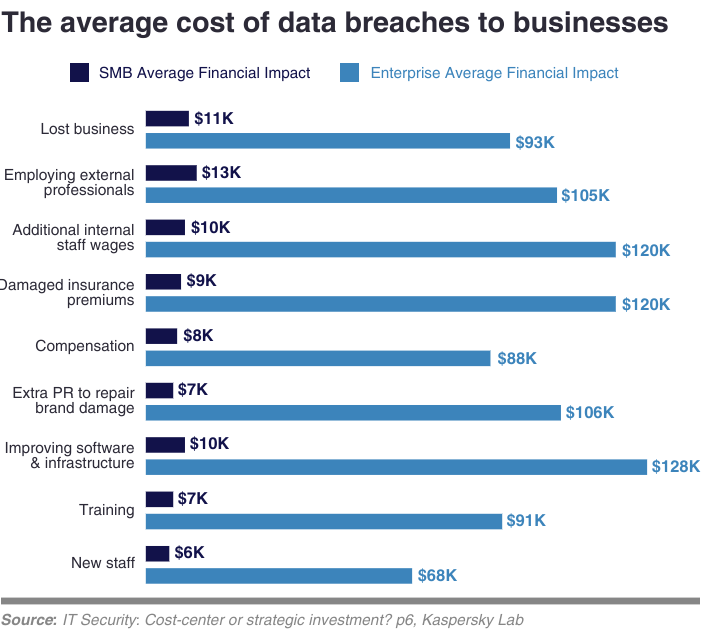
Serious data breaches are getting more expensive
Among SMBs, the average total impact of a data breach amounted to $84k, but this is more than ten times higher among enterprises, with the various aspects of a data breach costing as much as $938k.
Whereas last year, the reallocation of staff time represented the single largest additional cost for both enterprises and SMBs, this year the picture has changed, with SMBs and enterprises having different experiences.
The top pain points for SMBs include lost business and costs related to employing external professionals, but by contrast, enterprises incur the largest costs due to improving software and infrastructure.
Get the ITPro daily newsletter
Sign up today and you will receive a free copy of our Future Focus 2025 report - the leading guidance on AI, cybersecurity and other IT challenges as per 700+ senior executives
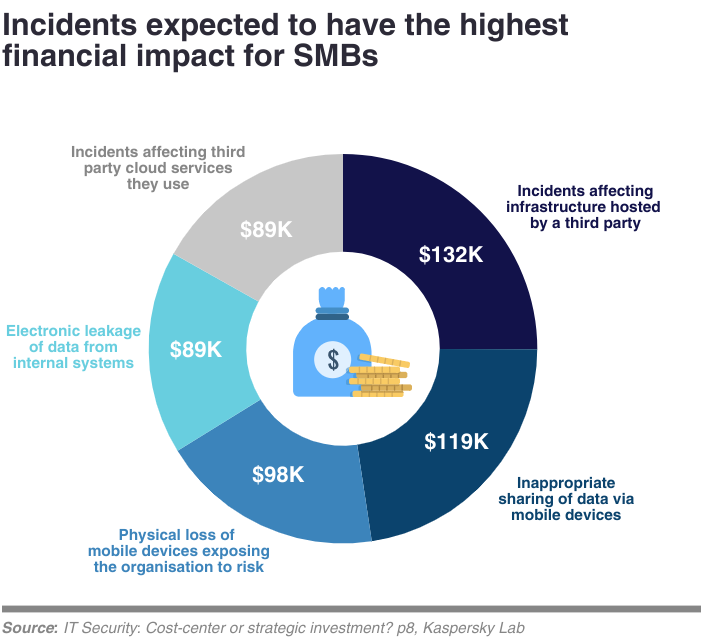
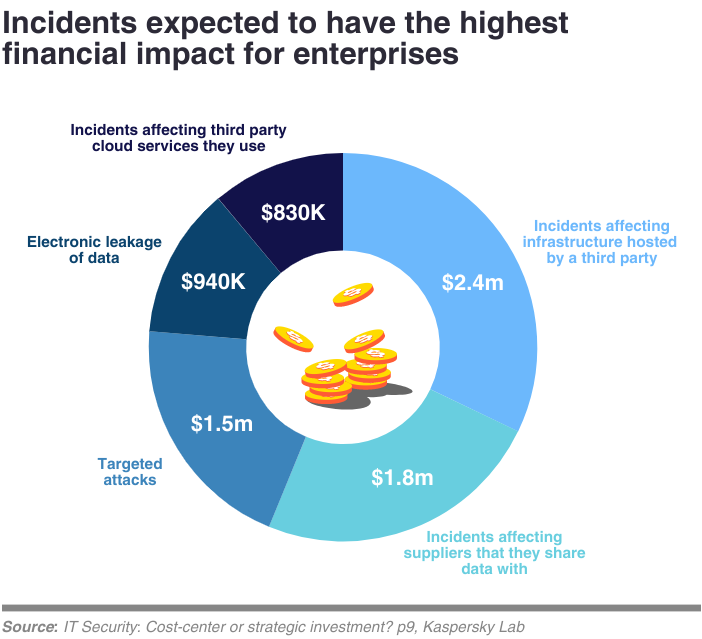
Third-party infrastructure is a key security weakness
For both SMBs and enterprises, incidents affecting infrastructure hosted by a third party are expected to have the most severe financial impact. This is clear in the experiences of businesses working with third parties for their cloud or other infrastructure, and also among enterprises that share data with suppliers.
As soon as one business gives another access to data or infrastructure, their weaknesses are shared. However, this is not something that most organisations give proper consideration to.
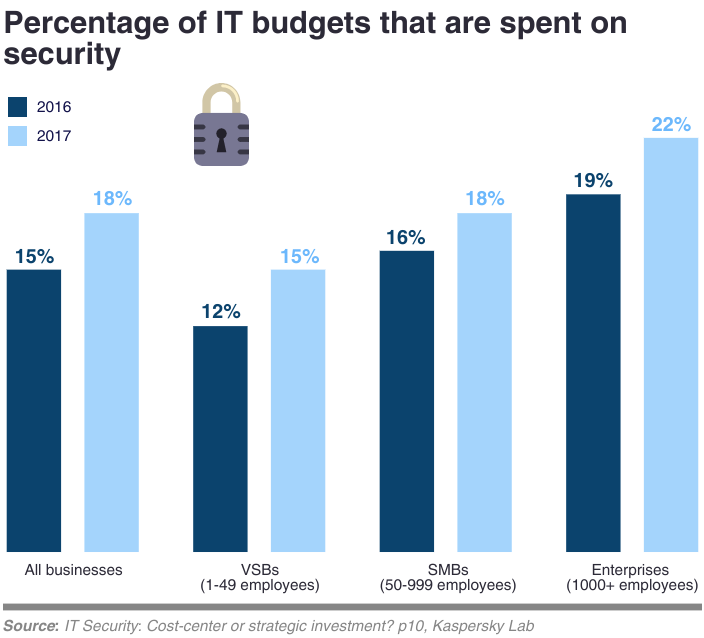
The proportion of IT budgets spent on security is rising
This year, cost saving and outsourcing efforts across many organisations appear to have resulted in a reduction in overall IT budgets amongst larger businesses worldwide. Despite this, the proportion of IT budgets spent on IT security is rising. This pattern is consistent across businesses of all sizes globally, but particularly among enterprises with over 1,000 employees, where the IT security budgets have risen from a fifth to almost a quarter of the overall IT budget in the last 12 months.
This represents a healthy growth in the importance being placed on IT security - something promising if businesses are to start viewing IT security as an investment rather than a cost-centre, particularly when the prospect of an attack is an expensive one.
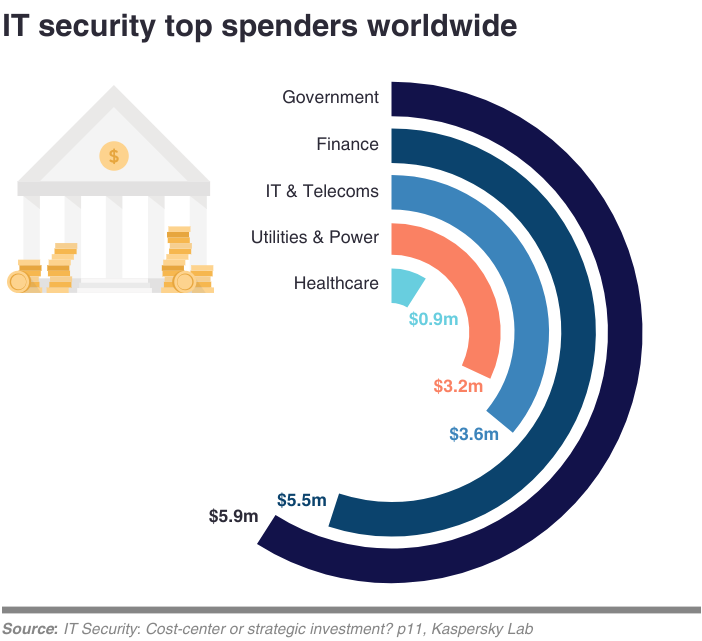
Government and financial institutions are IT security top spenders
Perhaps unsurprisingly, organisations involved in government (including defence) and financial institutions reported the highest expenditure on IT security this year, with both sectors reporting budgets over $5m on average.
IT and telecoms companies and utilities and power companies also spent more than average on IT security, although it is closer to $3m than the $5m+ spent by their government and finance counterparts.
For these firms, investment in IT security isn't just a cost that must be budgeted for. It's an increasingly crucial part of business continuity plans that will help organisations continue to function. When considering the cost of a cyber attack, IT security is, arguably, an investment with measurable benefits.
Esther is a freelance media analyst, podcaster, and one-third of Media Voices. She has previously worked as a content marketing lead for Dennis Publishing and the Media Briefing. She writes frequently on topics such as subscriptions and tech developments for industry sites such as Digital Content Next and What’s New in Publishing. She is co-founder of the Publisher Podcast Awards and Publisher Podcast Summit; the first conference and awards dedicated to celebrating and elevating publisher podcasts.
-
 Bigger salaries, more burnout: Is the CISO role in crisis?
Bigger salaries, more burnout: Is the CISO role in crisis?In-depth CISOs are more stressed than ever before – but why is this and what can be done?
By Kate O'Flaherty Published
-
 Cheap cyber crime kits can be bought on the dark web for less than $25
Cheap cyber crime kits can be bought on the dark web for less than $25News Research from NordVPN shows phishing kits are now widely available on the dark web and via messaging apps like Telegram, and are often selling for less than $25.
By Emma Woollacott Published